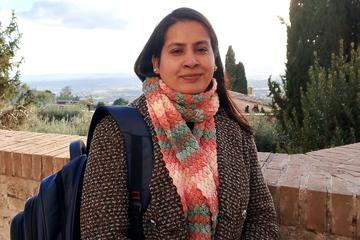By Laura Ieraci
CHICAGO — A joint Lenten series offered by a Presbyterian church and a Catholic church in small-town Clarkston, Washington, during the COVID-19 pandemic is the inspiration and model behind a new book that seeks to equip and engage lay people in ecumenical dialogue at the grassroots level.
Karen Petersen Finch, author and professor of pastoral leadership, is working to promote ecumenical dialogue among the laity in her new book, “Grassroots Ecumenism: The Path Towards Local Christian Kinship” (2022). Petersen Finch, an ecumenist and ordained minister of the Presbyterian Church, teaches at the Presbyterian College and at McGill University in Montreal, Canada.
Her book elaborates on the concept of “local ecumenism,” which has not gotten much traction in academic circles to date, she says. Aside from the book “Local Ecumenism” (1984), edited by André Birmele, there is very little mention of local ecumenism in the literature, she says.
Indeed, most references to local ecumenism indicate that “it should be happening, but it isn’t,” she adds. The local ecumenism Petersen Finch is promoting goes beyond fellowship, neighborliness and shared good works to engage differences in doctrine.
Petersen Finch admits “the idea of actually dialoguing in a doctrinal way at the grassroots level is pretty rare.” However, she insists that grassroots ecumenism “has to have the doctrinal piece.”
“Because if doctrine is part of the problem, it needs to be part of the solution,” she continues. “And lay people know that’s what keeping them apart, not just culture, not just attitudes. It’s really different truth claims.”
Beliefs underlying Petersen Finch’s proposals are that “lay people can thoroughly understand the doctrine of their own church and can dialogue skillfully with the beliefs of neighboring churches” and that “the work of national and international experts on church unity is not finished until the lay people in local settings participate in it.”
“We’re not assuming that lay people are somehow stupid,” she says. “You don’t need to be trained for 100 years in theology to participate in a dialogue where the seeds of collaboration can happen and begin to grow.”
She admits that adult faith education is “consistent work,” but this does not discount an adult Christian’s ability to engage in ecumenical dialogue that goes beyond good works.
Petersen Finch says she has seen occasions for ecumenical dialogue become opportunities for “supercharged adult education,” motivating adults to learn more about their own faith tradition in order to have the ability to engage the other and enter into relationship with them.
“You carry the face of your tradition and it’s concretized,” she says.
“Grassroots Ecumenism” tells the story of how members of Holy Family Roman Catholic Church and First Presbyterian Church met over five weeks in Lent 2022 to dialogue on differences in doctrine. The book also elaborates on their method of dialogue and the impact on the community.
The lay faithful were joined by their pastors, who were both supportive of the dialogue. Pastors’ involvement “makes a huge difference,” says Petersen Finch, giving church members “that permission to engage.”
For those who are interested but intimidated by their lack of skill in ecumenical dialogue, Petersen Finch teaches dialogue skills in her book and presents them in ways that are easy to learn. The book also offers the theological foundations and reflections on the participation of the laity in ecumenical dialogue in ordinary life.
At the heart of the dialogue process is friendship, which must be nurtured and developed, says Petersen Finch, who has noticed in many church communities the tendency for some members to be more naturally “ecumenically minded.”
“They’ve already created a web of relationships through an interchurch network, maybe it’s a Bible study, maybe it’s just a long friendship between a Catholic woman and a Presbyterian woman,” she says.
She proposes that churches find these people “and put the opportunity and the resources in their hands.”
Petersen Finch first conducted part of her research and writing during a sabbatical in Rome 2018, living during that time at The Lay Centre, an intentional ecumenical and interreligious community of lay scholars. She completed her book during the COVID-19 pandemic lockdown. Cecil M. Robeck, theologian, ecumenist and Assemblies of God minister, whom she befriended at The Lay Centre, wrote the forward.
The book was launched last fall in Clarkston and received excellent reviews from scholars, but the intended audience, says Petersen Finch, is the people in the pew. She hopes many communities will use “Grassroots Ecumenism” as a handbook to guide their local efforts at ecumenical dialogue. The book even includes samples for flyers and meeting schedules.
Petersen Finch underlines that her book is also about “the power of small movements.”
“While the world is moving away from the other, these small, humble, gentle movements are the kingdom seeds,” she says. “Local ecumenism is really about peacemaking in a dark world.”
“Grassroots Ecumenism: The Path Towards Local Christian Kinship” is available for purchase at New City Press and on Amazon.


